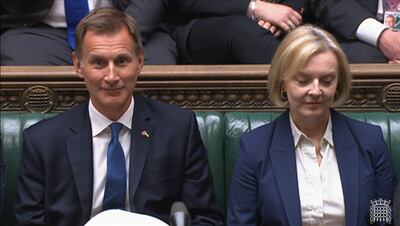Britain’s new chancellor has warned the country that it will face financial challenges of “eye-watering” difficulty in the days ahead, as he sought to bring stability to the economy.
During an extraordinary day in British politics, Jeremy Hunt attempted to bring stability to the Conservative Party and the economy by introducing tight fiscal measures following a run on the pound and the government debt markets.
The announcements marked a near complete reversal of the policy from Prime Minister Liz Truss, who had authorised an unfunded tax giveaway in her first weeks in office.
Ms Truss had seen her authority openly under question for much of the day and she sat ashen-faced, looking somewhat shell-shocked while Mr Hunt gave his statement.
Her new chancellor said the government needed to “do more, more quickly to reassure the markets” and it had to make decisions of “eye-watering difficulty” if necessary.
“I want to be completely frank about the scale of the economic challenges we face,” he added
His earlier public announcement, brought forward from his Commons statement to reassure the markets, had the wished-for impact, with the pound retaining its gains and the interest on gilts dipping below 4 per cent, a strong indicator for government borrowing costs.

Mr Hunt also announced a new economic advisory council that will include Rupert Harrison, chief of staff to former chancellor George Osborne
As well as reversing the 1p cut to basic income tax, restoring it to 20 per cent, Mr Hunt curtailed the generous energy cap to six months rather than two years.
About 30 minutes into his appearance, to gasps and a few jeers, Ms Truss got up and left. She was not in the chamber to hear the possibility of yet another government U-turn after the new chancellor suggested there could indeed be a windfall tax on energy companies — something she has fought vehemently against.
“I'm not against the principle of taxing profits that are genuine windfalls. Nothing is off the table,” he told MPs.
His opposite number, Rachel Reeves, who welcomed her fourth chancellor of the year, tore into the Conservative economic record that has been eviscerated by Ms Truss’s administration.
“There is lasting damage which these policy U-turns won’t change,” she said. “They set fire to everything, now they insist it is all fine.
“The truth is, an arsonist is still an arsonist, even if he then runs back into the building with a bucket of water.”
It was “ordinary working people” who were paying a “Tory mortgage premium” for years to come, she added.
To glum faces on the benches opposite, she declared the Conservatives were “running out of credibility … and now running out of chancellors”.
Mr Hunt also sought to push back against suggestions that a period of severe austerity was on the cards.
“I was a Cabinet minister in 2010 when we had very difficult decisions to take in the wake of the financial crisis and my department’s budget was cut by 24 per cent and I don’t believe we are talking about anything of that scale,” he said.
“And I think it’s likely that cash spending will continue to go up but, that said, I want to be completely frank with people — we are going to have very difficult decisions both on tax and spending in the next couple of weeks.
“We will try and take those decisions as compassionately as possible, so it’s going to be tough going forward but I don’t expect it to be on a scale that she suggests.”
The Conservatives have suffered a collapse of popular support amid fears of what is to come. The latest poll gave Labour a 36 per cent advantage over the Conservatives, the largest lead for any party since 1997.
More significant for Ms Truss was the revelation that half of those who voted Conservative in 2019 would prefer Mr Starmer as prime minister.
If that poor polling continues, Ms Truss’s tenure will rapidly prove untenable.


